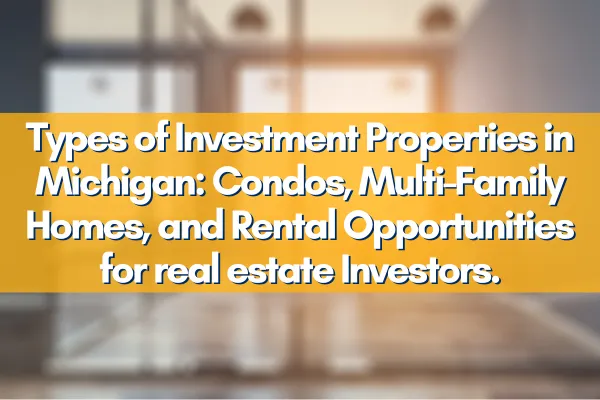
Types of Investment Properties in Michigan: Condos, Multi-Family Homes, and Rental Opportunities for Real Estate Investors
Dan's Investment Series Part 5
Types of Investment Properties in Michigan Discover the Opportunities in Ann Arbor and Beyond
If you're considering diving into Michigan real estate investing, you’ve probably wondered about the best types of investment properties that balance income potential with market stability. From condos to multi-family homes, the options are diverse and exciting, especially in market hotspots like Ann Arbor, Michigan. I’m Dan DeCaupa, a dedicated Real Estate Agent specializing in Ann Arbor’s vibrant market. Today, I’ll walk you through the most common investment property types in Michigan and how each could fit into your real estate portfolio.
Understanding Michigan Real Estate Investing
Michigan boasts a thriving real estate market with a mix of single-family homes, condos, multi-family buildings, and rental opportunities. Its relatively affordable prices, combined with a growing population and strong university presence, particularly in Ann Arbor, make it a prime location for property investment.
Market data shows that the Ann Arbor housing market remains robust with an active rental market driven by the University of Michigan and various tech companies. This creates a fertile ground for passive income properties and property wealth building.
The Main Types of Investment Properties in Michigan
When exploring investment properties in Michigan, especially in Ann Arbor, the main options are:
- Condominiums (Condos)
- Multi-family Homes
- Single-family Rental Homes
- Commercial and mixed-use properties (less common for traditional investors)
Let’s delve into each type to understand their pros and cons.
Condos for Investors in Michigan
Michigan condos are appealing due to their affordability and lower maintenance obligations. These properties often attract young professionals and students seeking convenient, lock-and-go living.
In Ann Arbor, condos like those near campus or downtown offer great Michigan rental income opportunities. The market for Michigan condos for investors remains active, particularly with generational shifts favoring city living.
Pros:
- Lower purchase price compared to single-family homes
- Maintenance often handled by HOA
- Competitive rent potential in prime locations
Cons:
- HOA fees reduce profits
- Limited customization options
- Potential for stricter HOA regulations
Multi-family Homes in Michigan
Multi-family investment properties in Michigan include duplexes, triplexes, and larger apartment buildings. These are the backbone of many Michigan real estate investors' portfolios because they generate multiple income streams from one property.
In Ann Arbor, multi-family investment properties can yield significant passive income and facilitate wealth building. The demand for rental units may even outglide vacancy risks, especially in neighborhoods close to campus or tech hubs.
Pros:
- Higher income potential
- Diversified tenant risk
- Ability to scale holdings faster
Cons:
- Higher purchase price and maintenance costs
- More complex property management
- Potential zoning restrictions
Michigan Rental Property Opportunities
Looking at the bigger picture, rental properties in Michigan encompass both condos and multi-family homes but also extend to single-family homes. The Michigan rental property market has remained resilient, with ample opportunities in Ann Arbor and surrounding cities.
This segment allows investors to generate passive income, especially with Michigan single-family rental homes that match a demand for stable, long-term tenants.
Best practices for Michigan rental income opportunities include:
- Targeting neighborhoods with good schools and amenities
- Analyzing township regulations for rentals
- Leveraging local property management companies to ease landlord responsibilities
Specifics for Ann Arbor’s Market Insights
Ann Arbor’s housing market offers unique advantages. Its median listing prices stay competitive, and the rental market supports consistent demand driven by the university and medical centers.
In 2024, the market has shown stable appreciation with a notable increase in rental yields. For Michigan property investors, understanding Ann Arbor’s local economy can radically shape your investment priorities.
How to Choose the Right Investment Property in Michigan
Your choice depends on your goals—whether it’s passive income, property appreciation, or portfolio diversification. Here are actionable tips:
- Start with detailed market research tailored to Ann Arbor and Michigan’s broader trends
- Consider the property management’s ease—multi-family units may need more attention
- Leverage local market insights and current data for accurate valuations (see my detailed Michigan property investment guide)
- Analyze cash flow potential and vacancy rates—Ann Arbor offers promising rental income opportunities with low vacancy
For local expertise and tailored advice, connect with me directly. I can help you identify the best investment properties in Michigan suited to your financial goals.
Resources and Further Reading
For a deep dive into Michigan’s real estate market, you might find the Michigan real estate investing topics by Norges Bank useful. Additionally, the Michigan landlord guide provides essential insights for managing rental properties efficiently.
If you’re keen to learn more about the Michigan housing market or want personalized guidance on investment buying, feel free to reach out.
---
Ready to start or expand your Michigan real estate portfolio?
Call Dan DeCaupa at 734-730-7061 or email [email protected] for expert guidance in Ann Arbor and beyond.
Visit my website spotlighthometeam.com for market updates, property listings, and investment tips specifically tailored to Michigan investors.
---
The Michigan real estate market continues to offer compelling opportunities for savvy investors. Whether you’re seeking Michigan condos for investors or Michigan multi-family investment properties, your next property is waiting.





